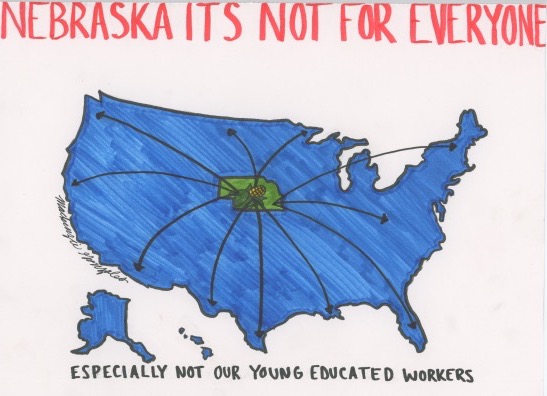Nebraska is losing its minds
The state has been experiencing a gradual brain drain that has seen many well-educated young citizens leave the state for better career paths

Nebraska has lost a lot of talented citizens from migration to other states
December 10, 2019
Most brain drains refer to a country losing well-educated citizens because they want to pursue better career opportunities elsewhere in the world. The event is usually viewed as a country to country exchange, however, it can happen on a domestic level as well. A drain has been happening to states across our nation for the better half of a decade. Many areas of the United States have been suffering from a gradual brain drain that has become more noticeable in the latter half of the 2010’s.
That’s not an accident.
The Deep South, Rust Belt and Great Plains have lost more young, highly-educated citizens as they have become increasingly mobilized and more likely to migrate to the coast. Smaller cities are hurting the most, seeing as many of their highly educated citizens leave for larger urban areas.
Nowhere is this problem more apparent than in Nebraska.
The state has not had a good track record when it comes to keeping highly educated young people in the state after college. According to University of Nebraska Omaha Center for Public Affairs research demographer David Drozd, Nebraska is the 10th worst state in the country at retaining people 25 or older with a bachelor’s degree. He said the state will lose net a 2,000 people a year, resulting in around 20,000 in a decade, which is a large amount of talented people with a higher education removing themselves from the Nebraska economy.
And the economy is why this issue is so important.
UNO researcher Hank Robinson said in an interview with the Omaha World Herald that 90% of jobs in Nebraska require no experience and 70% only require a high school education, meaning there are not as many job opportunities for citizens with a higher degree as there would be in states like New York or California. There are still opportunities, yet they are fewer and further between, causing people to migrate to a bigger market.
Though Nebraska ranks 15th in the country for employment according to the Bureau of Labor Statistics, a Brookings Institution report in 2016 found the state only ranks 40th for H3 job opportunities, which are based on heavy research and STEM fields. It may refer to itself as “The Good Life,” but Nebraska is creating an unhealthy amount of surplus jobs that don’t require a higher education, leading people to leave because there are less chances to pursue their desired career. Additionally, Nebraska fails to provide jobs with favorable incomes. According to State Senator Kate Bolz of Lincoln, the state annual pay is 21% lower than the national average.
Not only does Nebraska have difficulty with creating more high-paying H3 jobs for its citizens, but many graduating high school students leave the state for college as well. Millard West is home to many talented scholars and although some seniors are planning on staying in state, many have plans to attend college elsewhere in the United States.
Part of this factors into the coasts dominating STEM education and higher education as a whole. Schools like Cal Tech, Stanford and the Massachusetts Institute of Technology consistently rank as some of the best STEM research universities. Citizens in Nebraska with an interest and talent for complex research fields are more likely to go out of state due to the quality of different colleges. According to a New York Times survey, the state sends out around 1,200 high school students going to college each year, but welcomes 1,500 from other states. Pair that number with workers who have already completed their higher education and it’s clear Nebraska is losing a lot of young educated minds.
Furthermore, many of the students that stay in state for college end up leaving once they want to pursue their careers. Right now, Nebraska isn’t able to compete with elite coast schools and can’t seem to provide enough favorable job opportunities to young educated citizens in order to make them stay.
People should want to give back to their home state and help boost the economy. The problem isn’t that these migrants don’t want to have anything to do with Nebraska, but the state isn’t providing the resources they need for their careers to flourish. It is an undebatable fact that Nebraska is having a large brain drain problem.
The first step is that the state needs to work on bettering academic programs. It doesn’t have to go toe to toe with enormous market schools on the coast, but it does need to have a wide variety of quality programs in college that allows students to explore their career fields. The University of Nebraska Lincoln is the only large school in the state, compared to numerous big schools in states like California, Texas and New York.
Our state is in a tricky situation. It doesn’t have a flashy market with lots of money poured into it, but that may be what it needs to compete with the coasts. UNL being the only Division I school in the state hurts Nebraska recruiting students. For most people out of the state, the university is the only school they are familiar with. Building a reputation of having great programs not only at UNL but also in places like UNO and Wesleyan will aid in the brain drain dilemma because it will help draw in more students and show them there are more options in Nebraska.
However, bringing students to college won’t matter if they aren’t staying afterwards. The state needs to primarily focus on creating more H3 job opportunities for Nebraska citizens to keep more young educated people. Instead of focusing on creating jobs in general, it should make sure there are more chances for higher educated ones.
People want to come to their home state and give back to its economy. They want to be prideful of where they come from, but Nebraska needs to provide better educational and career opportunities and promote them well. If the state is able to do that, it may be the first steps in retaining more young educated people to help curb the brain drain problem.







